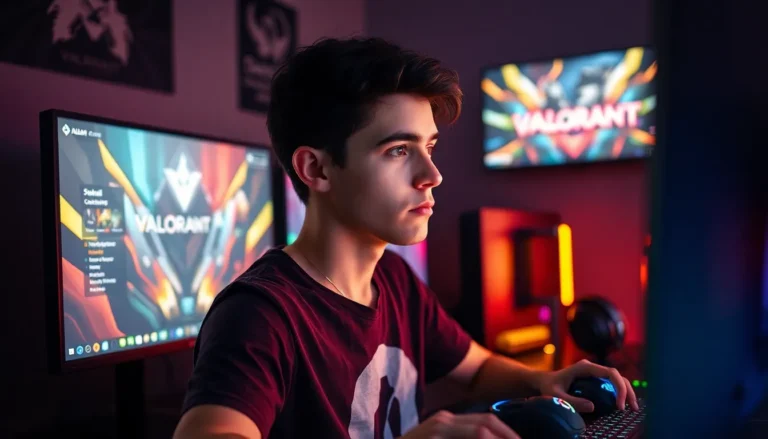Table of Contents
ToggleIn the fast-paced world of Valorant, time flies faster than a well-placed headshot. Gamers often find themselves asking, “How long do these nail-biting matches really last?” Whether you’re a seasoned player or a curious newbie, knowing the average game duration can help you plan your snack breaks and bathroom runs—because let’s face it, no one wants to miss that clutch moment.
Understanding Valorant Game Duration
Valorant matches typically last a significant amount of time. Knowing the average game length helps players strategize their gameplay and manage breaks effectively.
Average Game Length
Valorant matches average around 35 to 40 minutes. This duration includes the time taken for rounds, with each round clocking in at approximately 2 minutes. Extra time may occur due to additional rounds in closely contested matches. Players sometimes encounter time extensions caused by tactical pauses or overtime scenarios. The game’s format, structured into 12 rounds for one team to reach 13 victories, impacts overall duration significantly. Players accustomed to the pacing can use this information to schedule their play sessions efficiently.
Factors Affecting Game Duration
Several elements influence how long a Valorant game lasts. Match complexity varies based on team skill levels and strategies employed. Furthermore, individual agent abilities can prolong rounds if teams use their skills effectively to stall engagements. The map selection plays a role; larger maps may lead to longer game times due to increased travel distances. Player decisions, such as aggressive plays or conservative tactics, directly affect the pace of the match. External factors, like connection issues, can also introduce delays, contributing to unexpected duration changes.
Competitive vs. Casual Play
Competitive and casual play in Valorant presents different match durations, impacting player experiences.
Ranked Matches
Ranked matches typically last between 35 to 40 minutes, mirroring average match times. The competitive nature heightens intensity, often leading to closely contested rounds. In scenarios with evenly matched teams, overtime becomes more common, extending the duration. Each team strives to win 13 rounds, making close matches more strategic and tactical. As players face higher stakes, they may take longer to deliberate tactics and execute plays, further influencing overall game length. Consequently, players should anticipate potential delays during these matches.
Unrated Matches
Unrated matches generally follow a similar timeframe of 30 to 40 minutes. The relaxed atmosphere allows players more freedom in experimentation and casual playstyle. Despite fewer competitive pressures, unrated matches can also stretch due to tactical pauses or strategic discussions among teammates. Matches with players trying out different agents or strategies may last longer than the average. Despite being less intense, players often find enjoyment in this flexibility, adding to the richness of their gaming experience.
In-Game Events Impact
Valorant match duration can extend dramatically due to specific in-game events. Understanding these events helps players anticipate game length.
Overtime Scenarios
Overtime scenarios occur when teams reach a tie after the standard 12 rounds. These situations necessitate additional rounds until one team secures two consecutive rounds to win. Overtime can increase game time significantly, sometimes adding 10 to 15 minutes or more. Players often strategize more intensely, making every round critical. Closely matched teams frequently extend playtime as they aim for victory. This extra time can lead to nail-biting moments, as each round can shift momentum drastically.
Sudden Death Matches
Sudden death matches bring added excitement by implementing a win condition after a tie in overtime. The first team to secure a round in sudden death wins, further emphasizing the importance of strategy, communication, and execution. These matches typically conclude within a few minutes if teams perform well, but they can also extend as players carefully assess risks. The adrenaline rush during sudden death can alter player dynamics, as decisions made at this moment have a crucial impact on the result. Overall, sudden death can make every match unique, requiring players to be at their best.
Tips for Managing Game Time
Players can optimize their gaming sessions by understanding typical match durations. Valorant matches often range from 35 to 40 minutes, but several factors, such as strategies and player decisions, can influence this time. For effective time management, consider scheduling breaks after completing one or two matches.
Pay attention to game dynamics, as overtime can extend match time significantly. Closely contested games may add an additional 10 to 15 minutes, necessitating strategic pauses for players. Remember that unrated matches provide a more relaxed atmosphere, typically lasting 30 to 40 minutes. This setting allows players to experiment without the pressures of competitive rankings.
Stick to a routine or set a timer to keep track of play sessions. Frequent gaming can lead to fatigue, potentially impacting performance. Take advantage of game assessments between matches, allowing for discussion on strategies and methods that can enhance game time efficiency.
Schedule gameplay during off-peak hours to avoid connection issues that can extend match times. Monitoring network status boosts performance and reduces interruptions. Information from teammates plays a crucial role in maintaining an effective flow within matches.
Keeping these strategies in mind helps players navigate their time spent in Valorant, ensuring both efficient gameplay and necessary breaks. Adapting to predefined match lengths can elevate the overall gaming experience while sustaining engagement.
Conclusion
Understanding the duration of Valorant matches can greatly enhance a player’s experience. With average game times ranging from 30 to 40 minutes, players can better manage their schedules and avoid unnecessary interruptions. The competitive and tactical nature of ranked play often leads to longer matches due to strategic deliberations and potential overtime scenarios.
By being aware of factors that influence match length, such as team dynamics and external conditions, players can optimize their gaming sessions. Scheduling breaks and maintaining a routine can help prevent fatigue and improve overall performance. Embracing these strategies ensures a more enjoyable and efficient experience in the world of Valorant.






